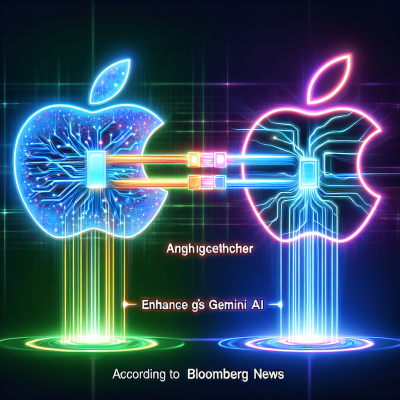
Apple Eyes Google’s Gemini AI to Supercharge Siri: What This Means for the Future of Voice Assistants
In a significant move that could redefine the landscape of smart voice assistants, Apple is reportedly in early discussions with Google to integrate the powerful Gemini AI into a revamped version of Siri. This development, initially reported by Bloomberg News, suggests the tech giants are exploring a collaboration that could reshape user experiences across Apple devices.
A New Era for Siri
Apple’s Siri has long stood as one of the most recognizable voice assistants in consumer electronics. However, over the years, it has faced increasing criticism for falling behind rivals such as Amazon’s Alexa and Google Assistant in terms of contextual understanding, adaptability, and conversational intelligence.
By potentially partnering with Google and tapping into its advanced Gemini artificial intelligence platform, Apple may be aiming to breathe new life into Siri’s capabilities, aligning it more closely with modern user expectations driven by highly conversational AI models like ChatGPT.
What Is Google’s Gemini AI?
Google’s Gemini AI is an advanced generative AI platform developed to offer nuanced conversational capabilities and deep contextual understanding. Introduced as part of Google DeepMind’s frontier AI initiatives, Gemini is positioned as a direct competitor to OpenAI’s GPT-4.
Key features of Gemini include:
- Multi-modal capabilities – integrating text, images, and possibly video inputs.
- Real-time learning – learning context from ongoing interactions with minimal delay.
- High scalability – adaptable across smartphones, home devices, and enterprise applications.
The integration of Gemini into Siri could usher in a far more intuitive and contextually aware assistant that understands not just commands but complex user intent and emotional tone.
Why This Partnership Matters
A collaboration between Apple and Google in the AI space could represent a pivotal shift in the competitive dynamics of tech. Apple has traditionally favored in-house development and tight ecosystem control, which makes the possibility of using a third-party AI model particularly noteworthy.
The implications of this potential deal are significant:
- Acceleration of AI deployment – It could dramatically speed up Apple’s AI roadmap by leveraging Google’s existing infrastructure and models.
- Reinvention of Siri – Users could see Siri transform into a contextually aware, conversation-driven digital assistant rivaling ChatGPT and Google Assistant.
- Benefits for end-users – Smarter voice commands, real-time translations, enhanced personalization, and improved multi-language support.
Challenges and Considerations
While the idea of a Siri powered by Google’s Gemini AI is tantalizing, it also raises important concerns:
- Privacy Concerns: Apple consumers appreciate the brand’s commitment to privacy. Incorporating a Google AI could prompt scrutiny over how user data will be handled and stored.
- Technical Integration: Bringing an external AI brain into Apple’s tightly controlled software and hardware ecosystem will be no small feat. Ensuring seamless performance without compromising existing experiences will be crucial.
- Strategic Risks: Depending on a rival’s technology may introduce long-term strategic vulnerabilities in Apple’s roadmap for AI innovation.
Previous AI Experiments & Apple’s Broader AI Strategy
Apple has been gradually investing in AI over the years, albeit more cautiously than its peers. The company recently released ML-powered features like image recognition, smarter photo search, and on-device machine learning for autocorrect and Siri suggestions.
In 2023, Apple acquired several small AI-focused startups and expanded its internal AI teams. However, the pace of visible progress in consumer-level generative AI has lagged behind that of competitors like OpenAI, Meta, and Google.
Opting to license Google’s Gemini could complement Apple’s broader AI strategy that interweaves privacy with intelligence. A Siri-Gemini hybrid might offer the best of both worlds: AI innovation at scale with Apple’s privacy-first ecosystem.
Will Apple Retain Control Over Data?
Though details of the talks remain confidential, any agreement will almost certainly include stipulations designed to protect Apple users’ data. It’s plausible that AI processing could be done on-device, or Apple would require that Google comply with strict privacy protocols similar to those it has implemented in past partnerships for services like Maps and Search.
Looking Ahead: What’s Next?
As of now, the discussions between Apple and Google are in their formative phase, and no deal has been confirmed. If the two companies do move forward, the earliest consumers could see a Gemini-enhanced Siri would likely be with iOS 18 or later, potentially in 2025.
That said, the renewed interest in AI adoption clearly illustrates Apple’s recognition of the generative AI wave and its commitment to not being left behind.
Final Thoughts
The potential integration of Google’s Gemini AI into Siri marks a major turning point for both companies and the future of virtual assistants. If executed thoughtfully, users could experience a vastly smarter, more helpful Siri capable of holding rich, nuanced conversations — a paradigm shift from the rule-based assistant that first launched over a decade ago.
As AI continues to dominate the trajectory of tech innovation, collaborations like this could accelerate the fusion of intelligent services and personal devices, bringing us closer to the truly intuitive, always-on digital companion of the future.
Stay tuned for more updates as this developing story unfolds.


Leave a Reply